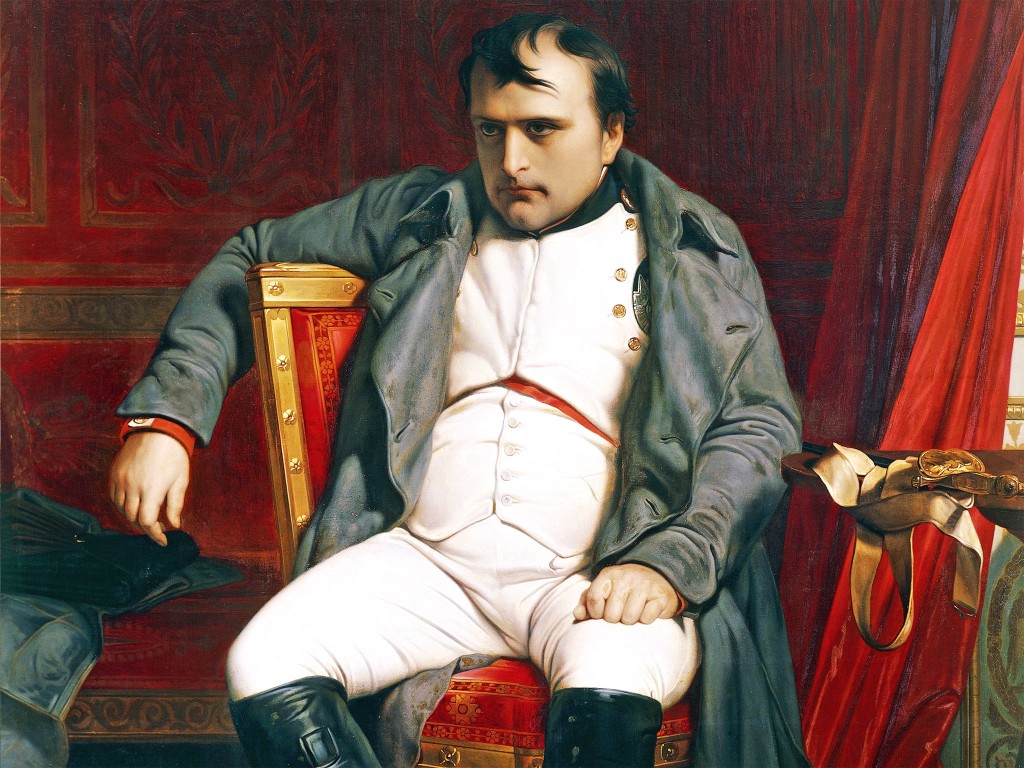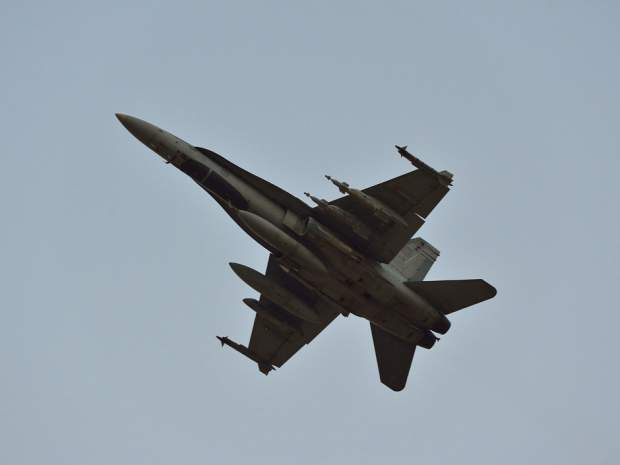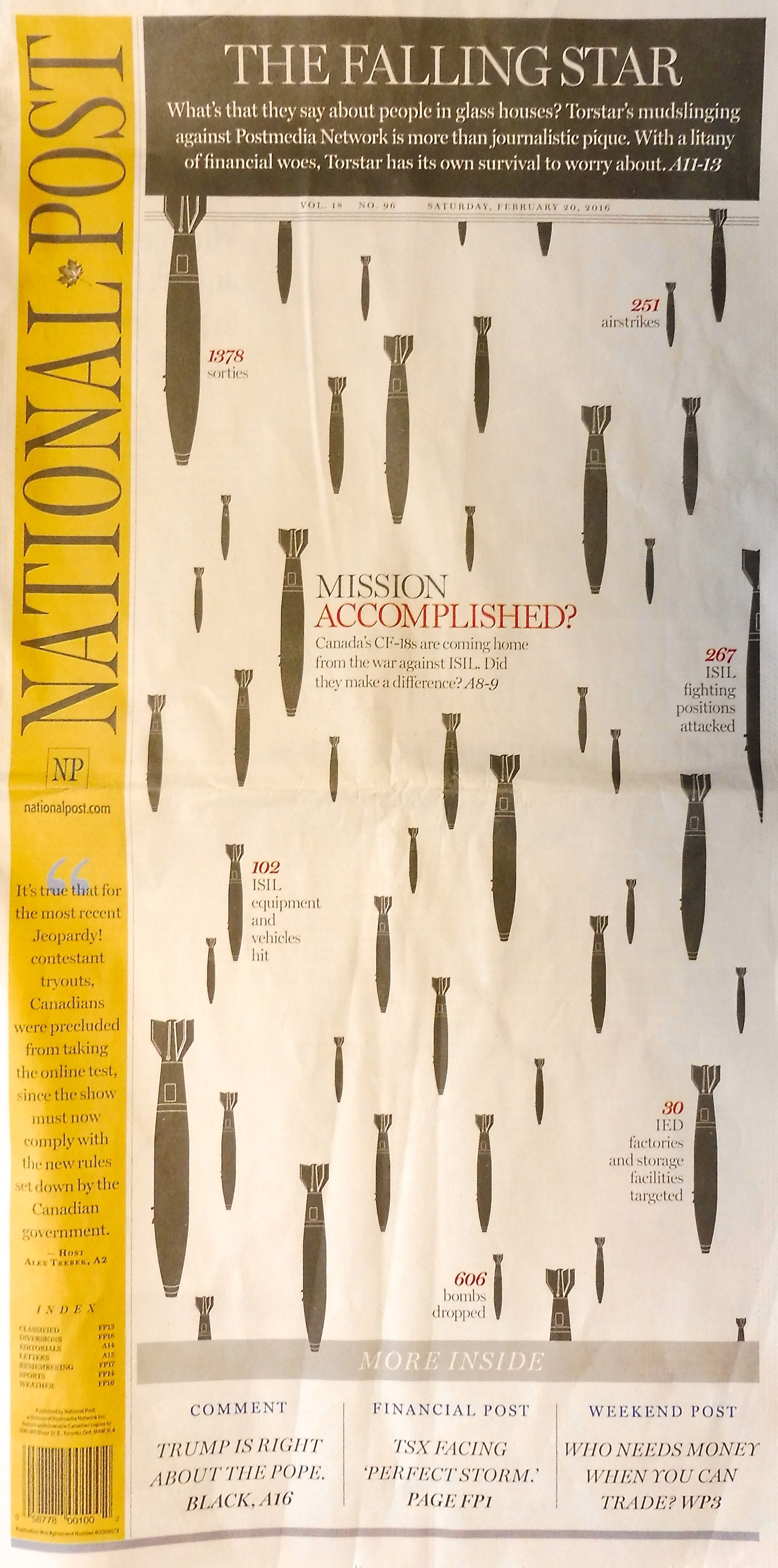Mission Accomplished?
Photo (Web Source): With great fanfare we sent C-18’s from Cold Lake winging their way to fight scattered bands of terrorists in Syria and Iraq. Many believed it was a worthy cause, but what did we really accomplish?
(Note: For the three people we met by the breakwater at lunch, I thought this article
might be of interest (February 29, 2016) Go to the Tim Horton’s Post for more Editorials.
Canada’s War Effort: By the Numbers
There is little firm data about the damage and death inflicted upon our enemies, but various press articles provide some front end details:
Estimated expenditure: Conservative Government estimates rounded to $600,000,000
Missions Flown: 250 (5 into Syria and 245 into Iraq)
Bombs Dropped: 600
Let’s do the math if the costs were applied equally in relation to each item:
Cost per Bomb dropped: $1,000,000
Cost per Mission: $2,500,000
Costs per each of the six CF-18’s: $100,000,000
Discussion: Why do we fight?
 Various Canadian and foreign military officials have conceded that Canada’s impact on the war against ISIS was negligible. However, we need to remember the deployment of those six CF-18’s was only symbolic in the first place. While the US fought, we tagged along. (ref. 1)
Various Canadian and foreign military officials have conceded that Canada’s impact on the war against ISIS was negligible. However, we need to remember the deployment of those six CF-18’s was only symbolic in the first place. While the US fought, we tagged along. (ref. 1)
Canada only entered the war for two reasons. One was to demonstrate our willingness to strike at the heart of our “enemies”. With an election looming the second reason was the government in power wanted to be seen as standing up for Canada against that brutal terrorist group ISIS, just as standing against the Niqab in Quebec was supposed to be seen as standing up for the rights of women. It mattered not whether anything was accomplished in either battle as the whole exercise was only meant to stir our patriotic emotions. Will our pending ground deployment be more successful? Probably not, as it’s also symbolic.
What we need?
We need to demand some real action by our Government, by first tabling a bill in Parliament declaring war on someone in the Middle East, probably ISIS in Iraq as it might get a little dicey if we declared war on the administration in Syria. That would put us in direct conflict with the Russians and on that point I think we might not only lose the war, we might even lose the Arctic in the process.
Second, if the declaration is passed, we need to mobilize the entire strength of our Army, Navy and Air Force by sending them off battle on our behalf. It will be costly war (many times more than deploying six CF-18’s), but remember, war is good for business. Once we get on a war footing, the demands for additional services and tax breaks by our people will be seen as self serving and as not supporting war effort.
Also, once businesses such as Bombardier and the Oil Sands Projects in Fort Mac get on war footing, the production of aircraft and other war materials, as well as the price of oil will skyrocket. War is good for the economy in difficult times. Even in peacetime, war is good particularly if sell weapons to the other side. Didn’t the Conservatives commit to selling $15,000,000,000 in arms to Saudi’s? Even our Mom, Britain, sold at least $15,000,000,000 and the United States outpaced us both at $60,000,000,000. This is just a short list of arms sales to the Saudi’s and others in the Middle East. Many other countries have also jumped on the wagon as Middle East is filled with opportunity to arm someone, friend and foe alike.
Third, should the Government decide against war, we could simply reassign our entire military towards building a wall between ourselves and our Southern neighbour. The way things are shaping up out down there, ISIS might seem like small potatoes after the next US election.
Another option, we could just rent out our entire military to Saudi’a, then let our men and women use the new weapons (the ones we sold to the Saudi’s) to fight proxy war on our behalf. It is a ‘win’ (we make money renting out our military), ‘win’ (we sell the weapons our military will use) and ‘win’ (we get to fight in a full scale war against ISIS and we make money in the process).
So the question still stands, “what do you think we should do?”
Background on why we fight wars
Prior to writing this article, I found an old paper written by Napoleon or one of his aids as his  armies smashed their way across Europe. They made plenty of money in the process and controlled much of the civilized world in the process as Napoleon looted the treasury of every country he conquered (just as in the past we have taken oil).
armies smashed their way across Europe. They made plenty of money in the process and controlled much of the civilized world in the process as Napoleon looted the treasury of every country he conquered (just as in the past we have taken oil).
The article in the footer provides an excellent description of what can accomplished by fighting either a real war or a proxy war on some issue like communism (cold wars), crime, drugs, terrorism, pollution, etc. We only need look south of the boarder to see how those wars have been conducted over the seventy years since the end of the Second World War.
Take a few moments and digest the following thinking on the subject of war in Napoleons day. See if you think it rings as true today as it did in his time.
Cheers,
Harold
1. Compare Syria and Florida
The report by the NP indicates the US dropped 11,000 bombs on Syria while Canada dropped 10. Think about this for a moment. Syria is a country that is approximately the same size as Florida and has (Syria at least had) about the same population (20,000,000).
How could you possibly drop 11,000 bombs on the State of Florida if the groups you were targeting were only some of a half dozen groups killing other groups as well as a State Government running around with their military killing its own people? Throw in the Russians bombing on the side of the Florida Government and you have a small country that is being bombed into oblivion to ‘save the people”. This whole thing seems to be to be completely insane and not one in the mainstream media seems to even give this a second sober thought.
2. Is war or the threat of war necessary?
(Source as noted in last paragraph of article)
War is a progressive force, naturally generating that which not otherwise have taken place. Free thinking and innovation are but two of the many positive aspects that war creates. War is an active force for society, a stabilizing and dependable tool.
The possibility of war forms the strongest foundation for any ruler’s authority, the extent of which grows in direct relationship to the ever-increasing threat war poses. Subjects will willingly obey as long as there is at least the promise of protection granted them from invaders.
Lose the threat of war, or breach the promise of protection, and all authority ends. War can bind the social allegiance of a people like no other institution. Central authority simply would not exist without war and the extent of any ruler’s ability to govern depends on the ability to wage war.
Collective aggression is a positive force that both controls dissent and binds social allegiance. War is the best method for channeling the collective aggression. Lasting peace is not in the best interest of maintaining central authority, nor is constant, never-ending war. Best is the mere possibility of war; since the perceived threat provides a sense of external necessity, without which no control authority can exist. Lasting stability can come simply from the organization of any society for war.
A feared external menace is essential for any central authority to persevere. Such menace must be believable and of sufficient magnitude to instill absolute fear, and must affect society as a whole. Without such fear, central authority could well collapse. A societal transition from war to peace will fail if a ruler does not fill the sociological and political void created by the lack of war. Substitutions for the channeling of collective aggression must be found, but these surrogates ust be both realistic and compelling.
Discussion:
The above does not match some aspects of our modern society, but it does match many particularly the last paragraph which suggests substitutions for war must be “both realistic and compelling”.
Of course those things that come to mind are all those substitutes mentioned in the main body of this post (nuclear holocaust (cold war), communism (Korean and Viet Nam Wars), crime, drugs, terrorism, global warming and so on. From the end of the last world wide conflagration (WWII) we have waged a constant battle against internal and external enemies.
hdm
National Post, Front Page, February 20, 2016
Two full pages also included as a Centrefold
(229)
Trackback from your site.


